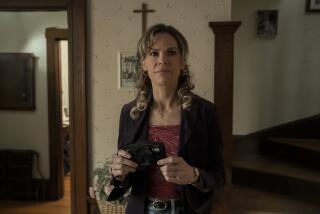PBS’ ‘Kind Hearted Woman’ moves beyond a portrait of poverty
David Sutherland is the director of three remarkable documentary films — I should say at least three, having seen only the last three — notable for their length and their depth: “The Farmer’s Wife,” from 1998, a 61/2-hour look at a farm family in crisis; the six-hour “Country Boys,” from 2005, about two teenagers in Appalachia; and now “Kind Hearted Woman,” set in North Dakota, Minnesota and southern Canada, which follows a Native American woman and her two children as they make a family in the wake of abuse.
All three films have made their way into the world through television — specifically the PBS series “Frontline,” which Monday and Tuesday on KOCE will present the new film in cooperation with “Independent Lens” — and together they form a trilogy on the subject of “rural poverty.” And they do indeed portray the stresses of life as it is lived on little money.
But to stop with that description is to draw a line around the subjects that does them a disservice. There is nothing programmatic about these films; they are not out to make a point but to show you a life. You can’t generalize from them, but in the striving (and failures, and striving) of its particular protagonists, you do connect with what it means to be human.
PHOTOS: Celebrity portraits by The Times
Sutherland wants you to get so close to his people that “you feel that you’re living in their skin, and go through it with them.”
“I’m a portraitist,” he said recently by phone as he was finalizing technical matters on the new film. “The issues come out of the characters.”
The new film centers on Robin Charboneau, an Oglala Sioux in her early 30s from North Dakota’s Spirit Lake Reservation. When we meet her, she is newly sober, back from rehab and having her apartment spiritually purified. You think for a moment that this is going to be a story about staying straight, but it turns into something quite different: Its business encompasses sexual abuse, child endangerment, divided families, incompetent bureaucracy and failed justice, but it is also about love, perseverance, child-rearing, growing up, self-knowledge and life in the North.
He follows his subjects over a long period of time; shooting for “Kind Hearted Woman” lasted three years and change, and his movies stretch accordingly. Length, Sutherland said, “lets you see your characters change, and often, especially in a film like this, where you have a protagonist who’s setting out on a new journey when you start, who’s sort of up in the air, you don’t know where you’re going.
“My stuff is so slow. I used to say I’m slow because it’s the rhythms of everyday life — on this film it’s a little faster, because it’s only five hours — but I don’t know how I could take it any faster and give you a feel for them and watch them change and make you care about them.”
Sutherland did not set out to make a film about Native Americans. He had wanted to return to the prairie, which he loves (he made “The Farmer’s Wife” in Nebraska), and to do something on the theme of abuse. He also “figured, seriously, that white men had caused Native Americans enough trouble, what did they need me for?”
But one thing led to another, and after interviewing 50 women, he settled on Charboneau.
PHOTOS: Hollywood backlot moments
“You need to find someone who you think can go the distance and also somebody who might be able to effect change, but that’s it. I wasn’t sure at first that she was the right one,” he said, “because she had worked on the same job for nine years, for the Bureau of Indian Affairs, so I looked at her as a passive character. “
He couldn’t have been more wrong. She was about to apply for college, leave the reservation — she moves several times in the course of the film — fight for custody of her children, and take her ex-husband to federal court over abuse of their daughter. Sutherland says he was continually surprised by the course of the story, even as the cameras were rolling.
“You have to adapt to whatever else is going on, welcome change and open your mind to it. Because everybody gets a take on someone or something and you just have to know that you’re wrong at least half the time.” Charboneau’s life, he said, would drive a story editor mad, with its “many exits, dead ends and starting up and going again, and you never know when she’s going to reach a great moment — and she does.”
“She’s a heroine,” Sutherland said of his star, who grows more beautiful as the film goes on and she goes from victim to advocate. “I’ve watched her become a great lady, She was always deep, and no matter how down she gets she has a good sense of humor. She’ll give a speech and I’ll tell her, ‘You know you were really good today, I’m amazed.’ And she’ll say to me, ‘Well, I won’t get a fat head, but I might get a double chin.”
Sutherland started out wanting to be a painter, “like my older sister — and I couldn’t paint.” A circuitous road led eventually to film.
“The first film I did on my own was a documentary on an old man in a diner called ‘Down Around Here,’” he said, “and I found I knew exactly how to tell a story. It’s like one day you’re 35 and you wake up and you can see everything clearly. I had no self-esteem, I hadn’t been doing anything I wanted to do, I was too immature as a kid in grad school. The one thing that’s problematic for me is I do a film and then it’s five or six years before another one, in the last three films 19 years have gone by. I’m not a kid anymore.”
I asked him why he was drawn to telling stories of the poor.
“As a kid I used to take my little brother on the subway in Boston to play at the YMCA,” he said, “and in that part of town there were so many poor people; I’ve always had a soft spot about poverty, and rural America always touched my heart. I was never afraid to go in those hollows in ‘Country Boys’ where a lot of people wouldn’t go. Because poverty scares you. But there’s a lot of sweet people stuck in bad places.”
---------------------------------
‘Kind Hearted Woman’
Where: KOCE
When: 9 p.m. Monday and Tuesday
Rating: TV-14 (may be unsuitable for children under the age of 14)
PHOTOS, VIDEOS & MORE:
PHOTOS: Behind the scenes of ‘Downton Abbey’
VIDEO: Winter TV preview
PHOTOS: Violence in TV shows
More to Read
The complete guide to home viewing
Get Screen Gab for everything about the TV shows and streaming movies everyone’s talking about.
You may occasionally receive promotional content from the Los Angeles Times.







